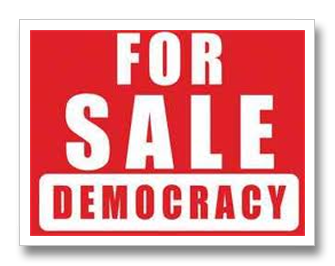Supreme Court to hear McCutcheon v. FEC removing remaining political donation limits
If you thought there was any hope of seeing money and politics parting, give it up. Just three years after loosening limits on corporate political donations in the Citizens United decision, the U.S. Supreme Court has agreed to consider whether to lift caps on how much individuals may contribute to candidates.
After consideration of a brief in McCutcheon v. Federal Election Commission, filed by Alabama businessman Shaun McCutcheon and the Republican National Committee, challenging limits on individual donations, the court has agreed to hear the case during its next session.
The case had suffered a setback in September when the three-judge U.S. District Court in Washington, D.C. rejected the argument that limiting donations was a violation of the First Amendment of the U.S. Constitution.
The Supreme Court will now consider the case in its entirety and should they decide in favor of McCutcheon it would likely decimate the landmark 1976 decision, Buckley v. Valeo, that upheld limits on individual donors.
Campaign finance expert and attorney Richard Hasen commented in response to the Court’s decision to hear McCutcheon said, “This case gives the court a chance to reconsider an issue resolved in Buckley, upholding aggregate limits on contributions. It’s not a watershed case in the sense Citizens United was, but it could extend that case’s logic to contribution limits, which could be very significant.”
Citizens United removed limits on independent expenditures made by companies and unions to support or oppose political candidates basing its ruling on a First Amendment right to free speech.
Should the court agree with McCutcheon that limiting individual contributions violates the First Amendment a few individuals, on both sides of the political spectrum, would likely carry undue influence on the political process.
Fred Wertheimer responded to the courts review that “If the Supreme Court reverses its past ruling in Buckley, the Court would do extraordinary damage to the nation’s ability to prevent the corruption of federal officeholders and government decisions.”
McCutcheon, in the grand scheme of things, is a flea compared to the Warren Buffets and Bill Gates of the world, but it’s rarely the financial giants that bring such cases.
Shaun McCutcheon is chief executive of Coalmont Electrical Development Co, a general contractor in McCalla, Alabama, located about 20 miles southwest of Birmingham.
McCutcheon contributed $33,088 to various candidates in the 2012 election cycle, but had planned to contribute another $21,312; he was prevented from doing so by the $46,200 limit on contributions.
Contributions to national political parties, state political parties and non-party political committees is set at $70,800, as long as no more than $46,200 goes to either the state or non-party entities.
Should a ruling in favor of McCutcheon result in the Supreme Court lift those limits an individual could donate greater sums to a larger pool of candidates, in effect broadening their sphere of influence.
James Bopp, one of the lawyers on the McCutcheon team said, “The limits distort the system by forcing people to give money to SuperPACs and advocacy groups, when they would rather give money to individual candidates and parties. That drives money away from the most accountable and transparent actors in our political system, in favor of entities that are basically unaccountable to the voter.”
It troubles this author to agree with anything that remotely limits an individual’s right to free expression. Yet the influence that money brings into the political system corrupts the entire process. The more money you have the more “free speech” you have. What would happen if all money disappeared from the political system and all that politicians had to offer were their own words and their own past performance?
Our current system is purely pay-for-play and those in our state and federal government legislatures represent their donors to a far greater degree than their constituents. We must remove the influence of money from our political system, from the political action committees, the corporations, the unions and even the individual donor; perhaps then politicians would only serve the interests of the nation.
—————————————————————
Listen to Mr. Kaplan on NTN Radio Fridays at 3pm EST
Subscribe to Mr. Kaplan’s articles at Examiner.com
Read Mr. Kaplan’s blog at Conservatively Speaking
Email Mr. Kaplan at ken@conservativelyspeaking.us
Follow Mr. Kaplan’s tweets at ConsSpeaking


One thought on “Supreme Court to hear McCutcheon v. FEC removing remaining political donation limits”